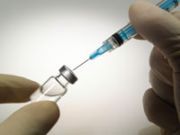Effective Treatment from a More Convenient Multiple Sclerosis Injection
A version of injectable interferon that multiple sclerosis patients can use far less frequently than existing products is proving safe and effective in clinical trials, its manufacturer says. Biogen Idec announced that new data from the second year of its Phase III clinical trial of peginterferon beta-1a (Plegridy) show it is well tolerated and appears to halt symptoms of relapsing forms of MS. Patients getting the drug had a lower risk of relapse, less disability progression, and fewer new brain lesions than those who got a placebo.

A version of injectable interferon that multiple sclerosis patients can use far less frequently than existing products is proving safe and effective in clinical trials, its manufacturer says.
Biogen Idec announced that new data from the second year of its Phase III clinical trial of peginterferon beta-1a (Plegridy) show it is well tolerated and appears to halt symptoms of relapsing forms of MS. Patients getting the drug had a lower risk of relapse, less disability progression, and fewer new brain lesions than those who got a placebo.
Interferon treatment has become standard in treating MS. What is new with the Biogen drug is that it is pegylated to extend its half-life. The result is that the Biogen drug stays in the bloodstream long enough so patients can go nearly two weeks without an injection. The currently available interferon beta-1b products must be injected every other day. Interferon beta-1b is made by Novartis (Extavia) and Bayer (Betaseron).
The Biogen results were presented Sept. 11 in Boston at the joint meeting of the Americas Committee for Treatment and Research in MS and the European Committee for Treatment and Research in MS.
The recommended dose is 125 micrograms injected under the skin every 14 days. The Biogen drug has been available in the UK since July and in the US since Aug. 14.
According to Biogen, potential treatment-associated side effects include liver problems, mood disorders including depression and suicide, seizures, and allergic reactions
.
Plegridy was evaluated in the ADVANCE trial, a 2-year, multi-center, randomized, double-blind, parallel-group, placebo-controlled Phase III study. After the first year the placebo patients got active treatment with the drug.
More than 1,500 patients were enrolled in over 180 sites in 26 countries. The pegylation process increases the size of the drug molecule, stabilizing it, and shielding it from enzymes in the body that eventually break it down.